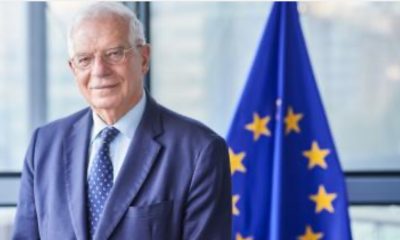corona
EAPM en ESMO bied innovasies aan gesondheidsbeleidmakers

For the eighth year in succession, the European Alliance for Personalised Medicine (EAPM) has held a high-level conference series alongside the annual ESMO Congress, skryf EAPM Uitvoerende Direkteur Denis Horgan.
The EAPM conference was opened with the announcement that the following article was published and contributed to by more than 40 experts across the EU on how to bring Greater Accuracy to Europe’s Healthcare Systems: The Unexploited Potential of Biomarker Testing in Oncology. Please click na hierdie skakel to have access.
Sessions include: Session I: Tumor Agnostic, Session II: Biomarkers and Molecular Diagnostics, and Session III: Utilising Real-World Evidence in a health-care setting. The conference runs from 08.00 – 16.00. Here is the skakel to the agenda. The conference aims to bring key recommendations to the EU level, so as to shape the EU Beating Cancer Plan, EU health Data Space, the updating EU Pharmaceutical Strategy as well as the EU Health Union.
The conference is held following the first State of the Union address by European Commission President Ursula von der Leyen on Wednesday (16 September) – in her first annual address, von der Leyen said the coronavirus pandemic had underlined the need for closer cooperation, stressing that people were “still suffering”.
"For me, it is crystal clear – we need to build a stronger European Health Union,” she said. “And we need to strengthen our crisis preparedness and management of cross-border health threats.” Von der Leyen said her commission would try to reinforce the European Medicines Agency and European Centre for Disease Prevention and Control.
And she also raised the importance of the European Beating Cancer Plan as well as European Health Data Space. “This will show Europeans that our Union is there to protect all,” she said.
Fabrice Barlesi, medical director of Gustave Roussy, said: “RCTs are no longer the way to go. A way ahead could be EU support for trialing a new drug and delivering data to a centralised registry, which could give good consolidated data from across Europe.”
Divided into three sessions, the EAPM conference at the ESMO Congress, as mentioned, dealt with such diverse issues as tumour agnostics, biomarkers and molecular diagnostics and real-world evidence in a health-care setting. Concerning cancer, specifically tumours, the congress stated that tissue-agnostic cancer drugs are antineoplastic medicines that treat cancers based on the mutations that they display, instead of the tissue type in which they appear.
These drugs include, for example, Entrectinib, Pembrolizumab and Larotrectinib. Former Spanish health minister and MEP Dolors Moseratt highlighted her support for the work of EAPM and looks forward to getting the recommendations of the outcomes from the conference. “The European added value of health is obvious. It would avoid duplication and enable a better allocation of resources. And it will minimize the risk of fragmented access to therapy across member states.”
And the EAPM conference is at pains to seek the best ways forward for the implementation of Real-World Evidence (RWE) into health care in Europe – looking to find consensus with key decision makers, including at member state level, not least with representatives in the European Parliament, on how to proceed in this area. RWE for health care is a simple concept – harnessing various health data in real time to help make faster and better medical decisions.
Real-World Evidence is an umbrella term for different types of health-care data that are not collected in conventional randomised controlled trials, including patient data, data from clinicians, hospital data, data from payers and social data.
Rosa Giuliani, consultant in medical oncology at the Clatterbridge Cancer Center, said: “Key elements to advance the use of TACs is to conduct dialogue that transcends silos, and to explore re-engineering of the development pathway.” And, as far as biomarkers and molecular diagnostics are concerned, a lot has been said about testing, and often the lack of it, in terms of the COVID-19 outbreak, with different countries adopting different strategies and, also, having different resources when it comes to acquiring necessary kits.
The key focus in the ESMO session was on better and more equitable access to biomarkers and molecular diagnostics across Europe. This is a must, but, as the attendees acknowledged, we’re a long way short of it. Access to personalised medicine and new diagnostic technologies can help resolve many inefficiencies, such as trial-and-error dosing, the potential for increased hospitalisation time due to adverse drug reactions and the problem of late diagnoses. It may also enhance the effectiveness of therapies through better tailored treatment administration.
In conclusion for the morning session, Giuseppe Curigliano, associate professor of Medical Oncology at the University of Milano, and head of the division of Early Drug Development, at the European Institute of Oncology said: “A real challenge to overcome is the different endpoints between investigators and payers. Policy frameworks and co-operation is essential.” The session in the afternoon will focus on utilizing real-world evidence in a health-care setting.
A report will be available next week.
Deel hierdie artikel:
-

 Konferensies3 dae gelede
Konferensies3 dae geledeNatCon se aan-af-konferensie is deur die Brusselse polisie gestaak
-

 massa toesig4 dae gelede
massa toesig4 dae geledeLek: EU-ministers van binnelandse sake wil hulself vrystel van kletsbeheer grootmaat skandering van private boodskappe
-

 Konferensies4 dae gelede
Konferensies4 dae geledeNatCon-konferensie gaan voort by die nuwe Brusselse lokaal
-

 Europese Buitelandse Aksiediens (EAAS)4 dae gelede
Europese Buitelandse Aksiediens (EAAS)4 dae geledeBorrell skryf sy posbeskrywing


























